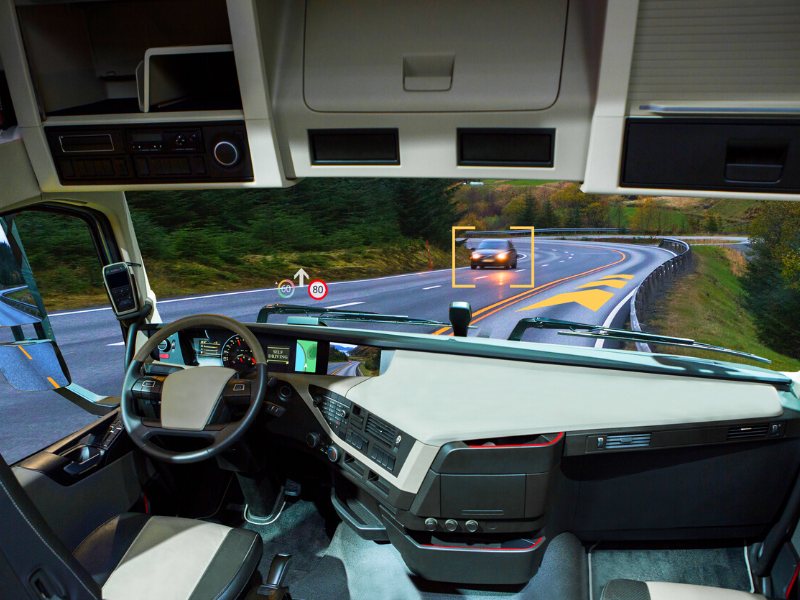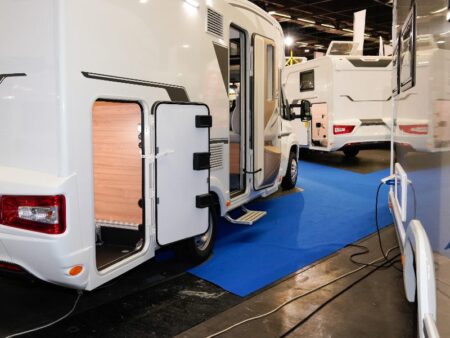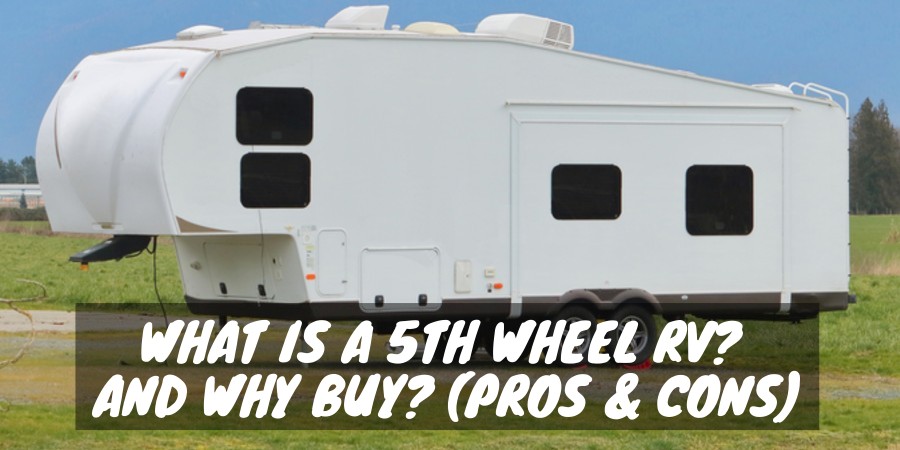With self-driving cars becoming a reality, will the future include self-driving RVs?
The idea of kicking back and letting your RV do the driving sounds like a fantasy, but several recreational vehicle manufacturers are working toward a viable self-driving RV. Unfortunately, the timeline for an autonomous RV to hit dealer floors is still years away.
To keep you up-to-date with this latest technological trend, let’s look at the details of self-driving vehicles, what companies are developing self-driving RVs, and when you can expect them to become a reality.
What Is a Self-Driving Vehicle or RV?
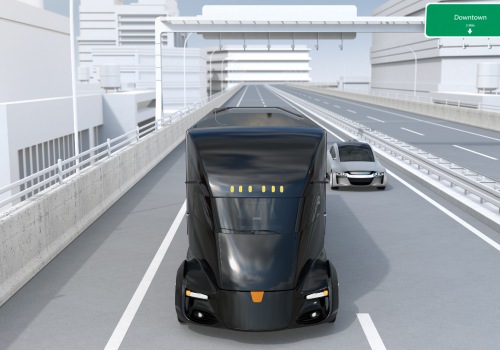
Self-driving (autonomous) vehicles are any car, truck, or RV that doesn’t rely on a driver or passenger to be at the wheel during operation. The National Highway Traffic Safety Administration refers to independently driven vehicles as automated vehicles.
Modern cars implement many “autonomous driving” features, such as automatic lane assist, cruise control, or instant braking if the vehicle senses other cars or obstacles too near. However, a driver is still required to perform most tasks while in motion to avoid collisions and reach a destination safely.
While many companies are actively working on the technology to build and market self-driving cars and RVs to consumers, as of today, no fully autonomous vehicles are ready for purchase in the US.
How a Self-Driving Vehicle or RV Works

The only way an RV or passenger car can drive autonomously is through a combination of technologically-advanced sensors, software, cameras, Lidar radar, artificial intelligence, and precise GPS equipment that can pinpoint the vehicle and keep it within lanes of traffic.
The self-driving vehicle must also properly navigate stop signs, traffic lights, turns, merges, refueling, and other normal driving functions.
Using such technology on a self-driving RV will require extra software and equipment to deal with the excess weight, size, and instability of a motorhome, travel trailer, or fifth wheel.
Most future self-driving vehicles will have passengers onboard, which means the driver can rest, eat, or interact with other passengers instead of dealing with the stress of vigilant concentration while driving.
Self-Driving Vehicle Risks

Self-driving vehicles are not market ready because there are many concerns and tests necessary to pass for them to operate safely. In addition, combining all the different technologies and having them work together seamlessly without fail is a challenge engineers are trying to overcome.
Some industries employ autonomous vehicles where traffic lanes are in private, remote locations, such as mining operations. The risk of these unmanned vehicles to workers and equipment is low; therefore, they work well.
However, these self-driving vehicles must constantly navigate unforeseen road obstacles and traffic patterns for people traveling in RVs on vacation or in their cars to run errands or go to work.
One error in the tech devices in a self-automated vehicle that weighs thousands of pounds can lead to serious and even deadly accidents, and human intervention may not happen quickly enough to avert damage.
Another aspect of the risks of self-driving vehicles is human error.
The most significant selling point of buying an autonomous vehicle is not having to pay attention while on the road, giving people a false sense of security.
But, unfortunately, with a mix of traditional and autonomous vehicles on the street, the “driver” will still need to pay attention to traffic conditions and vehicle component operations to ensure an accident doesn’t occur.
We all live with random outages of cell phones, internet, and Wi-Fi service, and autonomous vehicles rely heavily on such wireless data transmission to operate successfully. Without a secure, reliable way to keep these technologies online 24/7 and safe from hackers is the biggest obstacle self-driving vehicles face.
As a percentage, the current line of self-driving vehicles in testing or some Tesla models has more accidents than human-driven ones, albeit the severity of the damage is less.
While it may seem a monumental task to overcome self-driving issues, the hard work of automobile and software engineers and new technology developments have many companies confident there will be autonomous cars and RVs on the road by 2030 or sooner.
5 Companies Planning Self-Driving RVs
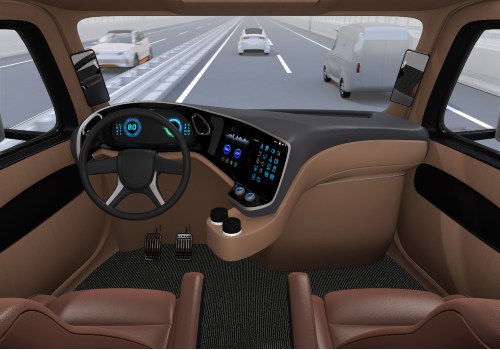
1. Cadillac
Cadillac hints at future manufacturing of a line of autonomous passenger vehicles from their “Halo Concept Portfolio” along with their RV “OpenSpace” that is still being teased to the public.
What information potential customers can gain about the OpenSpace are images that show a luxury campervan or motorhome RV with self-driving technology. The clean lines and futuristic design include a bar, a bed, large windows, and stairs that lead to a rooftop deck.
Cadillac’s design team calls the OpenSpace a “virtual sanctuary,” and the images are undoubtedly intriguing to the self-driving RV industry. However, until a physical OpenSpace concept RV hits the trade show floors, it’s anyone’s guess what the final product will feature and how it will impact changes in the market.
2. Hymar’s Galileo
When the German company Erwin Hymer introduced the concept Galileo RV in 2019, its self-driving capability was only one of its innovative features.
Built on a modular chassis, Galileo’s design for the motorhome includes a super sleek exterior with walls of windows on three sides, letting guests enjoy views of nature.
One highlight is the massive wing door that opens the RV to the outdoors while doubling as an awning. Another incredible feature is the deployable deck that provides an instant patio space that will avoid the hassle of dealing with uneven, grassy, or rocky campsites.
Inside, you find the most technologically advanced kitchen space, bunk beds, bathroom, and living space. All the areas use clever modular components where applicable to maximize space and function.
One highlight includes the ability for the Galileo to announce points of interest and become your tour guide during road trips, making each trip even more enjoyable. The software is also set to detect common RV issues, such as low-hanging branches or other obstacles, to keep the vehicle from damage.
Like other companies vying for recognition in the self-driving RV space, Erwin Hymer is updating their concept motorhome while waiting for “the world” to provide the infrastructure to support autonomous vehicles on the roadways, such as 5G networks and special driving lanes on highways.
The company hopes to be ready to roll as soon as autonomous vehicle infrastructure and safety regulations are in place. As of now, Erwin Hymer is offering to sell some of its technology to mainstream RV manufacturers to improve customer satisfaction during travel and camping.
Hymer Galileo Driverless Motorhome Concept of the Future (Video)
3. VW Bullis
Volkswagon wants to take its iconic van into the self-driving RV realm and has joined Argo AI to create the ID. Buzz VW bus. This concept van will debut in the US in 2023 and be ready for road trips by 2025.
The Buzz will be an all-electric, autonomous van developed for commercial ventures, but most expect camping enthusiasts will snatch them up to take on outdoor adventures.
The exterior design features a modern, sleek take on the original VW bus’s two-tone color scheme. Four doors on each side open for easy entry and exit, while the rear hatch opens to store camping gear or to sit and enjoy the scenery.
The interior features a traditional cab seating area for a driver and passenger, with substantial interactive displays. The second-row seats fold down to increase the area to stow items or can come out to open up the space for a bed or other components for camping.
Want to Connect With a Community of Over 1,078 RV Enthusiasts?
While advancements in current infrastructure will have to take place to allow buyers of the Buzz to enjoy all the features of autonomous driving, VW expects both European and US versions of their van to be a huge hit.
Volkswagen’s I.D. Buzz Concept Is Electric Self-Driving Microbus (Video)
4. Tesla Semi
If you love camping in your travel trailer but hate towing, consider the Tesla Semi. This EV truck hit the market in February 2022 and touts the ability to auto-pilot up to 500 miles before recharge.
The Tesla Semi is rated a Class 8 truck with a maximum towing capacity of 80,000 pounds.
The fifth-wheel hitch can let you pull any size camping trailer with ease. In addition, the Semi delivers more torque, improving highway travel acceleration.
Tesla states that the Semi is “The safest, most comfortable truck ever. Four independent motors provide maximum power and acceleration with the lowest energy cost per mile.”
The design of the Semi exterior is exceptionally aerodynamic, with large tinted windows. The cab is roomy, with a single, centralized captain’s chair, with two large displays on either side of the steering wheel to relay information or show side and rear cameras.
Many RV manufacturers, such as Winnebago, are hoping to use the Tesla Semi chassis and transform them into EV motorhomes with automated driving technology.
Elon Musk Officially Revealed the Tesla Model RV (Video)
5. Vanlifer
Vanlifer is a New Zealand van-conversion company that used the Tesla Semi with enhanced auto-pilot to create a concept EV motorhome called the Semi-Home.
With the first concept coming out in 2019, the company is waiting to expand its RV offerings until more Semi trucks roll off the assembly line. However, with huge advancements in AI, GPS, and software technology in the past few years, the first Vanlifer self-driving RV prototype is sure to be cutting-edge.
The Tesla Semi-home concept features a full kitchen, roomy living space, a private toilet, and luxury amenities found in high-end motorhomes and recreational vehicles. The exterior is super modern, with a low clearance that may make it a poor choice for off-road camping fans.
The cabover has a large, curved window to stargaze from the elevated bed in the evenings. The design includes another bed in the rear and a convertible sofa, so it’s spacious enough for family camping trips.
Travel days can utilize the autopilot feature to reduce driving stress and the EV system to save on fuel expenses, which is always a plus while RVing.
The Tesla Cybertruck Trailer Could Be Next! (Video)
In Summary
Progress marches forward, including self-driving technology for passenger and recreational vehicles.
Many companies are already developing the concepts for autonomous RVs, and time will tell if they will succeed. However, engineers of self-driving RVs say it’s possible to see them on the roads within the next 10 to 15 years.
If self-driving recreational vehicles can provide safe transport to camping destinations, it would significantly reduce travel day stress. If I can relax on the ride, I have to say I would be on board to give a self-driving camper a shot, would you?
"Man cannot discover new oceans unless he has the courage to lose sight of the shore."
-- Andre Gide

